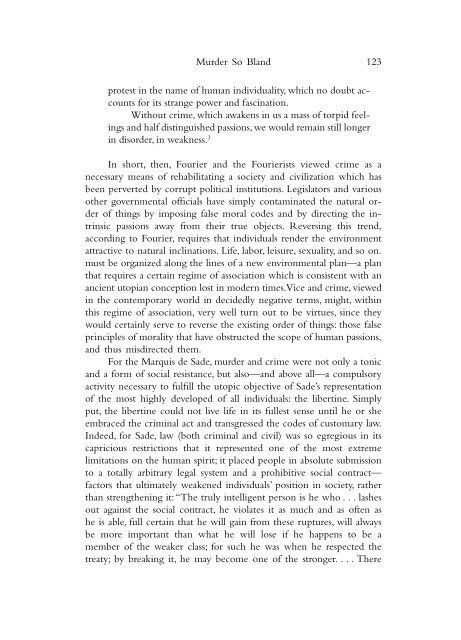You also want an ePaper? Increase the reach of your titles
YUMPU automatically turns print PDFs into web optimized ePapers that Google loves.
Murder So Bland<br />
protest in <strong>the</strong> name <strong>of</strong> human individuality, which no doubt accounts<br />
for its strange power and fascination.<br />
Without crime, which awakens in us a mass <strong>of</strong> torpid feelings<br />
and half distinguished passions, we would remain still longer<br />
in disorder, in weakness. 3<br />
123<br />
In short, <strong>the</strong>n, Fourier and <strong>the</strong> Fourierists viewed crime as a<br />
necessary means <strong>of</strong> rehabilitating a society and civilization which has<br />
been perverted by corrupt political institutions. Legislators and various<br />
o<strong>the</strong>r governmental <strong>of</strong>ficials have simply contaminated <strong>the</strong> natural order<br />
<strong>of</strong> things by imposing false moral codes and by directing <strong>the</strong> intrinsic<br />
passions away from <strong>the</strong>ir true objects. Reversing this trend,<br />
according to Fourier, requires that individuals render <strong>the</strong> environment<br />
attractive to natural inclinations. Life, labor, leisure, sexuality, and so on.<br />
must be organized along <strong>the</strong> lines <strong>of</strong> a new environmental plan—a plan<br />
that requires a certain regime <strong>of</strong> association which is consistent with an<br />
ancient utopian conception lost in modern times. Vice and crime, viewed<br />
in <strong>the</strong> contemporary world in decidedly negative terms, might, within<br />
this regime <strong>of</strong> association, very well turn out to be virtues, since <strong>the</strong>y<br />
would certainly serve to reverse <strong>the</strong> existing order <strong>of</strong> things: those false<br />
principles <strong>of</strong> morality that have obstructed <strong>the</strong> scope <strong>of</strong> human passions,<br />
and thus misdirected <strong>the</strong>m.<br />
For <strong>the</strong> Marquis de Sade, murder and crime were not only a tonic<br />
and a form <strong>of</strong> social resistance, but also—and above all—a compulsory<br />
activity necessary to fulfill <strong>the</strong> utopic objective <strong>of</strong> Sade’s representation<br />
<strong>of</strong> <strong>the</strong> most highly developed <strong>of</strong> all individuals: <strong>the</strong> libertine. Simply<br />
put, <strong>the</strong> libertine could not live life in its fullest sense until he or she<br />
embraced <strong>the</strong> criminal act and transgressed <strong>the</strong> codes <strong>of</strong> customary law.<br />
Indeed, for Sade, law (both criminal and civil) was so egregious in its<br />
capricious restrictions that it represented one <strong>of</strong> <strong>the</strong> most extreme<br />
limitations on <strong>the</strong> human spirit; it placed people in absolute submission<br />
to a totally arbitrary legal system and a prohibitive social contract—<br />
factors that ultimately weakened individuals’ position in society, ra<strong>the</strong>r<br />
than streng<strong>the</strong>ning it: “The truly intelligent person is he who . . . lashes<br />
out against <strong>the</strong> social contract, he violates it as much and as <strong>of</strong>ten as<br />
he is able, full certain that he will gain from <strong>the</strong>se ruptures, will always<br />
be more important than what he will lose if he happens to be a<br />
member <strong>of</strong> <strong>the</strong> weaker class; for such he was when he respected <strong>the</strong><br />
treaty; by breaking it, he may become one <strong>of</strong> <strong>the</strong> stronger. . . . There
















